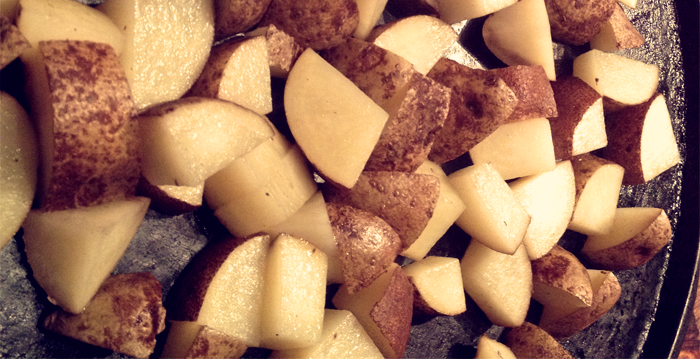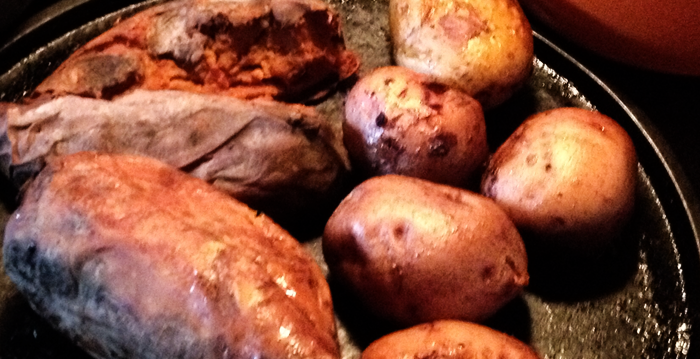We left off with some ideas: Yeah, calories matter but so do nutrients. Is the fat loss solution to just eat less? Probably. Maybe. I guess in some kind of way, yeah. But also take note to eat wholesome nutrient dense foods to give the body the stuff it need to repair itself function well. [...]

We left off with some ideas:
Yeah, calories matter but so do nutrients. Is the fat loss solution to just eat less? Probably. Maybe. I guess in some kind of way, yeah. But also take note to eat wholesome nutrient dense foods to give the body the stuff it need to repair itself function well.
Insulin might matter too. And starchy carbohydrates have the most play with insulin, so a low carbohydrate gig is something to think about for fat loss.
Although they may be good for fat loss, neither of the above are good news for muscle. Whammy.
This is a simpleton look, but it’s practical. We could talk about a billion other things here, like some foods might be inflammatory and how it doesn’t make sense to eat something that’s going to damage you when you’re trying to have food undamage you.
But if we went down the rabbit hole, I’d probably confuse you more than help you. (I’m projecting. I’d really just confuse myself.) For now, let’s wiggle out of this wrinkle we’ve worked ourselves into.
Opinions are aplenty
Eating less is certainly something to consider, but it’s a broad statement. I think that it’s possible for more to sometimes be less, like talked about last essay. But what about insulin? Should we keep carbohydrates low?
As usual, that depends on who you ask. Some studies show that carbohydrate intake has nothing to do with insulin sensitivity and that obese people even tend to have a greater flow of fat in and out of fat cells despite higher insulin levels. Some studies show that increasing carbohydrate intake doesn’t necessarily have a linear relationship with insulin levels.
What this all boils down to, in my opinion, is that it’s a really really complex world and making any sort of clear cut black and white linear predictions isn’t even worth our time.
not.worth.our.time.
I’ll save this rant for the end of this essay, but I think what will come out of it will be some of the most valuable advice I have.
Doing our best to push on, what we do know is this:
- Insulin is required for storage, and this includes muscle love.
- Cells do become more or less responsive to things (sensitive or resistant).
- One of the best ways to sensitize is to avoid—welcome to loopolgy.
So now that you’re scratching your head, let’s talk loopology
Learning loopology
Loopology is a made up word. (Because I like to make up words and feel smart.) It’s all about the body making use of feedback loops—responding to some kind of signal. Often times these are negative feedback loops in order to regulate your body around some kind of allostatic set pointish range of “good.” A negative feedback loop goes something like this: you’re thrown out of whack one way, the body tries to throw itself back in whack the other way.
- Your body is overheating, so you sweat to bring temperature down.
- Your body is teeming with sugar, so you release insulin to bring blood sugar levels down.
(A positive feedback loop would compound effects in the same direction rather than reverse.)
With insulin resistance, this feedback system runs quite fine. And that’s a part of the problem.
As the cells take on more and more baggage (we’ll use fat cells for easy example), they stop responding to insulin as well as they once did. We can run through theories as to why, but it’s likely the inverted-U curve that governs, it seems, just about everything. Some is good. More is better . . . to a point. And at that point, more is bad.

At some point, the fat cells simply can’t maintain the same efficient rate of nutrient-energy stockpiling. If you remember back to old body fat talks, you’ll remember me saying that according to Robert Sapolsky, the amount of fat cells within you is rather set after adolescence. (At least, I think I said this before?) What this means is that you have a finite number of cells that can only do so much.
With boatloads of nutrients-energy floating around from frequent high energy feedings, the energy doesn’t get tucked away easily. The body says, “What the heck? Why is all this energy still floating around? I’ll just toss more insulin into the pond.”
And it does. And the cells say, “What is all of this insulin berating me for? I’m doing what I can do, now leave me alone. If you keep prodding me, I’m going to ignore you.” And so the cells become resistant to the signal, much like the villagers ignored the boy who cried wolf.
One way to not become the boy who cried wolf?
Be mute your entire life.
And then speak.
Anecdotes of the black elixir
My body is caffeine resistant. I drink one too many cups per day trying to write these articles. When I first started drinking coffee, one cup was plenty to get me rabid. Now I have, well, for sake of my own dignity, let’s just say I have more than one and I don’t really think I get any sorts of rabidness. Ever. Don’t get me wrong. When the black elixir hits my tongue every morning, it becomes more sensual and religious as the days pass. But the “waking up” part? That’s a different story.
One of the best ways to get me back to my old state? To go mute. To not have any coffee. Because then my body would un-adapt itself to the stuff, and it’d be a novel substance when reintroduced.
If coffee was an important thing to me though, something that I needed to function well, then I’d be a little stuck. Obviously cutting it out all together wouldn’t be a great idea. So maybe instead I’d just have a little bit every day—bring my body back down to a sensible intake so that if I ever wanted a quick jolt, all I would have to do is have a more than that sensible intake.
But the only way for that would work would be to stay at that low-sensible level for a while.
Now, caffeine isn’t carbohydrates. But I think you get the idea.
Coffee logic and insulin sensitivity

By coffee logic, why not cut out all starchy insulin provoking carbohydrates and re-sensitize the body that way? Well, first off, coffee (a drug) isn’t exactly the same as a carbohydrate (a macronutrient). Secondly, going mute on carbohydrate intake introduces us to a world of nutritional ketosis. Our brains need glycogen to function optimally. The best glycogen fuel comes from carbohydrates. Without enough carbohydrates, the body starts breaking down fat and turning it into glucose. This is nutritional ketosis.
Ketosis sounds wonderful, doesn’t it? The body is using body fat, after all. But this might do funky things elsewhere, as the body isn’t too fond of nutritional ketosis. It’d rather make use of the more effective carbohydrate-glycogen relationship. So what happens?
The body locks up cells (makes them insulin resistant) around the body in favor of shuttling carbohydrates to be used for brain fuel. In other words: say bye bye to any future muscle ambitions.
But, as you know by now, it’s not really this easy. Since most people don’t have access to blood analysis, it’s hard to know when we’re in nutritional ketosis as everyone will hit that point differently. And then there are those that even say, yeah, ketosis is a little funky . . . until your metabolism starts to shift and familiarize itself with turning fat into glycogen. When that happens, you have super energy because fat stores are near infinite.
. . . but wait. If obese people have flow in and out of fat cells even with insulin resistance, then that means they’re still using fat right? What’s the difference?
Oh, and cancer. Don’t forget about cancer. Ketosis does good on cancer, they say. Carbohydrates? They feed cancer.
Oh, and . . .
OH MY GOD MY HEAD IS GOING TO FALL OFF. RAGE. WHAT DOES IT ALL MEAN. JUST TELL ME WHAT TO DO. RAGE AGAIN.
Patience.
The abyss gazes back
In the cooky world we live in, some preach low carbohydrate diets for fat loss when the Inuit Eskimos ear nearly all fat and are rather portly. Some say it’s impossible to lose fat on a high carbohydrate diet and the Okinawan’s eat nearly all carbohydrates and are rather thin. (Ironically enough, neither of them are obsessed over health like we are, yet both of them are healthier than we are.)
Nietzsche said that when you gaze into the abyss, the abyss gazes back. That’s what’s happening. It wasn’t intentional either, might it might as well had been. We’ve gazed into the carbohydrate-insulin abyss and it wasn’t pretty.
This is why a lot of people get stuck. How do you make sense of any of this? How do you pick any strategy without second guessing yourself?
Anything you do will likely have contradictory information.
Truth is that people a lot smarter than me can argue both sides of any decision you decide to make. But in my opinion, this is simply looking into the abyss.
What we’re missing in all of this is exactly what the abyss can’t give us. It’s not about taking the Okinawan or Inuit examples to heart either. That’s just as bad of a mistake as any. When you get into the black and white thinking, you’re in the abyss.
There’s one thing that gets us out, and it’s what a lot people fail to appreciate in just about every aspect of this world of physical training: context.
I know I told you that I was saving my rant for the end, but I went long. Next essay, we’ll dive into the rabbit hole and smooth this all over so that we can set up how to navigate through the three stages of skinny-fat syndrome.
We’ll create context.
Because without context, we can’t say whether or not anything (high carbohydrate, low carbohydrate, etc.) is either good or bad.